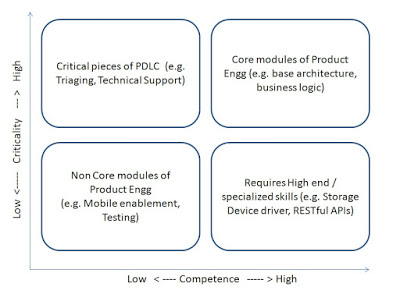After my last post, we finally arrive at a crucial juncture of how to outsource software product engineering. Before choosing a product engineering vendor / partner, one has to carry out the task with due diligence. The best way to begin is to start listing a few points as follows:
- Will the vendor be able to scale quickly when the need arises (including mitigation plan) with the required skills?
- Has vendor developed products before? If yes, how many? In my specific domain (or similar) across how many phases of PDLC?
- Securing IP and ensuring there is no breach of confidentiality (since vendors may work, currently or in future, on similar products)?
- Will engineer folks; those who are deployed (by vendor) on the product be able to gel into our company's culture (for some it might be less important, that said, it is an important element)?
- What related tools (ready to use or partly usable) can they bring to the table, typically used to reduce time to market or save cost?
- Stability - how long have they been in business, will they be around for next 3 to 4 years?
- Will I be able to engage in a dialogue with their domain experts / SMEs?
- And some more related questions…
You don't have to think through on points mentioned above or go into detailed analysis if you are thinking to outsource smaller / one time / one off projects (smaller component of a product). Typically, a person who drives projects can carve out a project which will test a vendor.
Larger companies typically have processes in place which enables them to choose the right partner. Smaller / Medium size / First time outsources have lot of challenges to find the right partner.
After submitting hundreds of RFPs (very in-depth kinds to very simple ones), realized that there are only few priority points which an ISV is looking for in a vendor. As a vendor if you are able to identify those key points and address it, you are most likely to win that RFP.
There are multiple ways to engage a vendor (engagement model); those who put their skin in the game are most likely your key partners.


